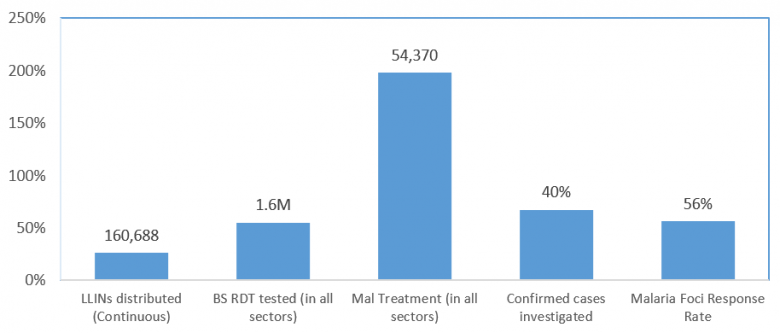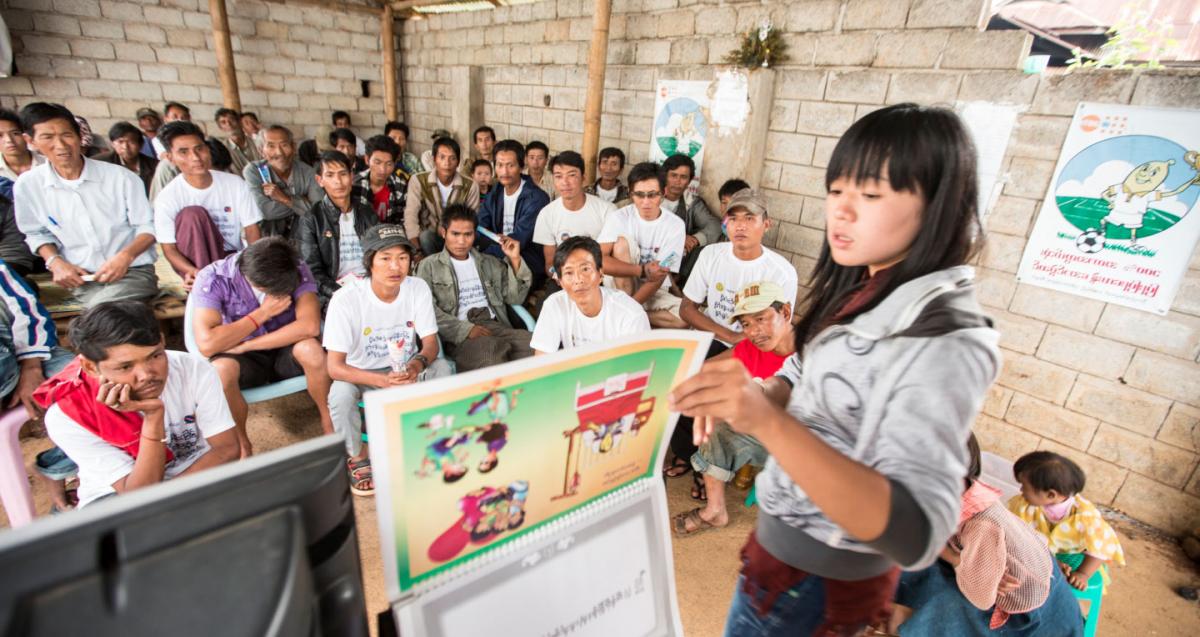
The results for 2021 are shown as a percentage of the annual target.
In 2021, the COVID-19 pandemic continued to cause major challenges in implementing malaria activities in the country. Moreover, in Myanmar, the political situation brought up many challenges in the way programmes were implemented. In these times of crisis, PR-UNOPS and its implementing partners continued to work hard to preserve the continuation of essential malaria services while undertaking COVID-19 infection control measures so that the interventions were ensured not to be interrupted.
The malaria grant supported the continuous distribution of 160,688 (26% of target) long-lasting insecticidal bed nets (LLINs) in 2021 . Moreover, 155,186 long-lasting insecticide bed nets were distributed through mass distribution to the displaced people who are residing in the areas where there is high malaria transmission. Due to the travel restriction because of COVID-19, there were some delays in the arrival of LLINs. Other factors such as political unrest and human resource shortages also affected the LLIN distribution.
About 1.6 million RDT tests (55% of target) were conducted across the country in 2021. Among them, 54,370 positive cases (76% of target) were treated. During the year, the reported malaria cases increased significantly compared with the previous year. The increase in the number of confirmed malaria cases were reported in Kachin, Rakhine, Mandalay, Mon and Kayin. Malaria outbreaks were reported in Waingmaw, Kachin State.
With the significant progress in reducing malaria morbidity and mortality during the last decade, Myanmar has been working to achieve malaria elimination by 2030. Following the launching of “Malaria Elimination field Implementation Manual” in 2020, efforts had been made to mobilize different stakeholders, to strengthen intersectoral coordination at different levels and to build capacity of implementation partners.
However, there was a delay in implementation of malaria elimination activities as planned at the field level due to political unrest and armed conflicts. About 40% of the cases from the elimination area were investigated and classified in 2021. Foci investigation and response activities were limited. However, certain response activities such as Reactive case detection and case management, LLIN distribution were conducted to mitigate risk of outbreak.
In order to enable the Integrated Community Malaria Volunteers (ICMVs) to have enough stocks in hand, two to three months’ buffer stock of the key commodities such as Rapid Diagnostic Test (RDTs), Artemisinin-based combination therapy (ACTs), Chloroquine and Primaquine were distributed to make sure that the provisions are uninterrupted. In addition, mobile phone bills were provided to the ICMVs so that the case-based reporting was not interrupted due to the internet connectivity issues.
Moreover, surgical masks, gloves and hand sanitizers were procured and distributed for the safety of healthcare workers. ICMVs were instructed to wear masks and gloves while conducting RDT tests; to keep physical distancing while traveling to malaria endemic areas; and to refer all the patients with COVID-19 related symptoms or those who have travel history to areas where there is local transmission of COVID-19 to nearest health centers.


